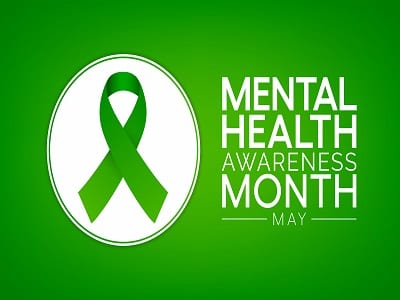Every May, organizers of Mental Health Awareness Month seek to raise awareness about mental health, aiming to fight the stigma associated with mental health conditions, provide support and resources for those affected by mental illness and advocate for policies that increase treatment resources for those in need.
First observed in 1949, Mental Health Awareness Month offers countless ways for organizations, businesses, groups, and individuals to help connect those with mental illness with the support and quality care they deserve.
Widespread stigma toward those with mental illness still exists, causing many people to be hesitant about requesting help. The National Association of Mental Illness (NAMI) encourages everyone to take part in the national movement to spread the message “You Are Not Alone” to encourage acceptance of mental illness as a health condition and provide better access to treatment resources.
What is Mental Illness?
The American Psychiatric Association defines mental illness as a health condition that adversely affects emotions, thinking, or behavior. Mental health problems can cause dysfunction in a person’s social, work, school, or family activities.
Millions of people worldwide live with a mental illness. In the U.S., studies find 50 percent of all mental illness begins by age 14 and 75 percent by age 24.
According to the National Council for Behavioral Health:
- 1 in 5 U.S. adults experiences mental illness each year.
- 1 in 20 U.S. adults experiences serious mental illness each year.
- 1 in 6 U.S. youth ages 6-17 experience a mental health disorder each year.
- Suicide is the second leading cause of death among people aged 10-34.
- 46 percent of people who die by suicide had a diagnosed mental health condition.
Mental illness impacts individuals, families, communities, and society. Sadly, many people suffering from a mental health disorder do not receive needed treatment, according to NAMI. They note that:
- Fewer than half the adults who are diagnosed with a mental illness will receive the treatment they need.
- Suicide rates continue to increase in the United States, especially among gay, lesbian, and bisexual youth and transgender adults.
- Among incarcerated individuals, mental health issues remain common. For example, an estimated 70 percent of young people in the criminal justice system have been diagnosed with a mental illness.
- Veterans also struggle with mental illness, with more than 40 percent of veterans who seek care at VA hospitals diagnosed with mental health challenges.
White House Proclamation on National Mental Health Awareness Month 2021
President Joe Biden officially proclaimed May 2021 as National Mental Health Awareness Month. In his proclamation, President Biden asks “citizens, government agencies, organizations, healthcare providers, and research institutions to raise mental health awareness and continue helping Americans live longer, healthier lives.”
The President’s American Rescue Plan Act of 2021 provides resources to help Americans recover from the economic and health effects of the COVID-19 pandemic. The act also contains provisions to aid in the integration of mental health and addiction treatment programs into primary care settings, schools, and homes.
How to Spread the Word During Mental Health Awareness Month
You can help those who feel alone in their struggle with mental illness. Your blogs, personal stories, social media posts, videos, and sponsorship or participation in this month’s awareness events help spread the word that mental disorders are not shameful but are, in fact, legitimate health conditions that need professional treatment.
Use the following resources to help recognize and support Mental Health Awareness Month. With some planning, you can continue your support throughout the year.
Resources provided by the National Council for Behavioral Health include:
- Mental health facts and figures
- Examples of social media messages recognizing this month
- Blog posts offering mental health resources
- Links to videos, webinars, and other educational content
Resources provided by NAMI include:
- Downloadable infographics to help show how common mental illness is and its physical, social, and financial impact
- Downloadable graphics and images for social media posts, profiles, and logos
- Extensive statistics showing the impact mental illness has on individuals, families, demographic groups, the community, society, and the world; mental illness in the criminal justice system; the suicide rate; and access to care.
- NAMI also provides educational resources including signs and symptoms of mental illness and effective treatment modalities.
Other opportunities to help spread mental health awareness this month include:
- Join the NAMIWalk
- Attend the NAMI National Convention
- Become a fundraiser
- Join the pledge to be “stigma-free”
The NAMI resource guide, You Are Not Alone, provides a wealth of information about May’s Mental Health Awareness Month and July’s Bebe Moore Campbell National Minority Mental Health Awareness Month.
While the stigma attached to mental illness affects people across all demographics, NAMI CEO Daniel H. Gillison states that “the effect of racism and racial trauma on mental health is real and cannot be ignored.” The Bebe Moore Campbell National Minority Mental Health Awareness Month in July raises awareness about how certain backgrounds and identities can make it more difficult for some to access treatment resources.
Share Your Story
Throughout May, NAMI invites you to share your personal stories about mental illness and to read stories written by others. NAMI’s goal is “to make people feel less alone in their mental health journeys and increase awareness about mental illness.”
Turning Point of Tampa has been offering Licensed Residential Treatment for Addiction, Eating Disorders and Dual Diagnosis in Tampa since 1987.



